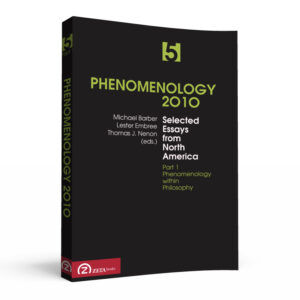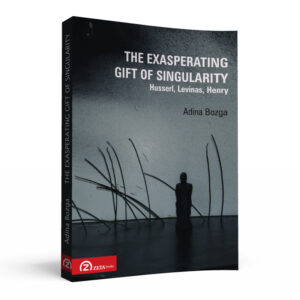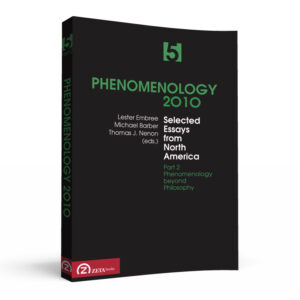Even though this volume represents half of the essays from the North American region, it reflects the breadth and scope of interest that characterized the international meeting of phenomenologists in Hong Kong. It contains nineteen essays from Canadian and United States phenomenologists representing thirteen different phenomenological organizations. This volume is organized roughly—give that there is an inevitable overlapping—in terms of the historical figures in the phenomenological movement, beginning with Edmund Husserl, and then following with sections devoted to the Contemporaries of Husserl, The First Generation after Husserl, and Other Authors and Themes. Of course, each of these section headings often embraces a variety of philosophers, with, for example, “The First Generation” including the work of Jean-Paul Sartre, Maurice Merleau-Ponty, Emmanuel Levinas, and Paul Ricoeur. In addition, in each section the essayists take up different aspects of the thought of these figures in the tradition or find novel applications to areas that these figures might never have anticipated. One has the sense in these essays that phenomenology is a growing philosophical movement encompassing a rich variety of thinkers and topics, across generations and across continents.
CONTENTS
Introduction to Volume 5: The Breadth of Phenomenology
Michael D. Barber
I. Edmund Husserl
1. Elizabeth Behnke: The “Remarkably Incompletely Constituted” Body in Light of a Methodological Understanding of Constitution: An Experiment in Phenomenological Practice (I)
2. Lester Embree: The Justification of Norms Reflectively Analyzed
3. Saulius Geniusas: What does the Question of Origins Mean in Phenomenology?
4. George Heffernan: From Violence to Evidence? Husserl and Sen on Human Identity and Diversity: Toward a Postcolonial Phenomenology of Humanity
II. Contemporaries of Husserl
5. Zachary Davis: Scheler and the Task of Human Loving
6. Eugene Kelly: In lumine Dei: Scheler’s Phenomenology of World and God
7. Leonard Lawlor: What is the Outside?
8. Douglas F. Peduti, S.J: Heidegger’s Later Phenomenology: Allowing the Subtle Appearance to Emerge through the Din
III. The First Generation
9. Bruce Baugh: Freedom, Fatalism, and the Other in Being and Nothingness and The Imaginary
10. Eric Duffy: Anguish and Nausea as Calls to Action
11. Matthew C. Eshleman: The Misplaced Chapter on Bad Faith or Reading Being and Nothingness in Reverse
12. Emma R. Jones: On the Life That is ‘Never Simply Mine’: Anonymity and Alterity in Merleau-Ponty and Irigaray
13. Matthew J. Goodwin: Art and the Deflagration of Being: Maurice Merleau-Ponty’s Aesthetic Phenomenological Method
14. Shazad Akhtar: Between Oneself and Another: Merleau-Ponty’s Organic Appropriation of Husserlian Phenomenology
15. Sarah LaChance Adams: The Pregnable Subject: Maternity and Levinas’s Relevance to Feminism
16. Michael Barber: Ethics, Eidetics, and the Ethical Subject: A Critique of Enrique Dussel’s Appropriation of the Thought of Emmanuel Levinas
17. David Leichter: The Dual Role of Testimony in Paul Ricoeur’s Memory, History, Forgetting
IV. Other Authors and Themes
18. Caroline Rebecca Lundquist: Recovering the Tragic: Exploring the Ethical Dimensions of Rape-Related Pregnancy
19. Peter Westmoreland: Rousseau’s Phenomenological Model for the Co-Constitution of Self and World Ț
ISBN: 978–973–1997–73–5 (paperback)
ISBN: 978–973–1997–74–2 (ebook)






